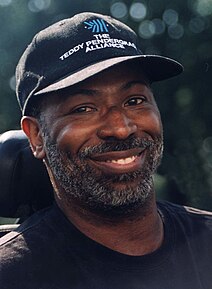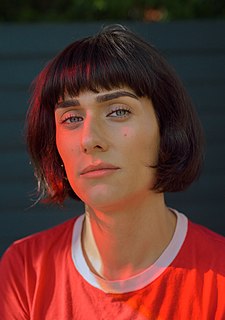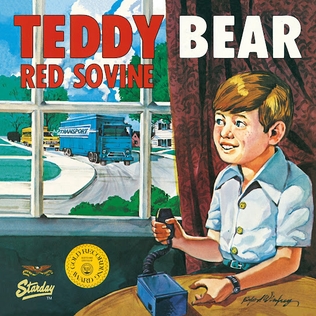Guy is an American hip hop, R&B and soul band, and were the creators of the new jack swing style of the late 1980s and early 1990s.

Theodore DeReese "Teddy" Pendergrass was an American singer. Born and raised in Philadelphia, Pennsylvania, he initially rose to musical fame as the lead singer of Harold Melvin & the Blue Notes. After leaving the group over monetary disputes in 1976, Pendergrass launched a successful solo career under the Philadelphia International label, releasing five consecutive platinum albums, then a record for an African-American R&B artist. Pendergrass' career was suspended after a near-fatal car crash in March 1982 that left him paralyzed from the chest down. Pendergrass continued his successful solo career until announcing his retirement in 2007. Pendergrass died from colon cancer in January 2010.

Teddy Boy Blues – Yohko Ishino is a 1985 arcade game made by Sega. It stars a young boy who is armed with a gun. Each level is an infinitely-repeating maze with several dice. Each die is filled with monsters which hatch out and the player must shoot to shrink, then collect them. If the player does not collect each shrunken monster quickly, it turns into a time-eating bug which flies to the time limit bar and consumes a chunk of it. If you touch one monster or run out of time then you lose a life. The game ends if all lives are lost. There are 50 distinct levels, called "rounds" in the game, even though the counter goes to 99. The player can play through the levels loops infinitely, with no apparent end. There are also "bonus rounds" every so often where the player can shoot colored dice to reveal prizes and increase his or her score.
Woodrow Wilson "Red" Sovine was an American country music singer and songwriter associated with truck driving songs, particularly those recited as narratives, but set to music. The most noted examples are his 1965 number one hit "Giddyup Go" and his 1976 number one hit "Teddy Bear".

John Theodore "Teddy" Geiger, II, also known as as teddy<3, is an American singer-songwriter and musician. Signed to Columbia Records as a teenager, Geiger's debut album, Underage Thinking, released in 2006, sold more than 360,000 copies and spawned two singles, "For You I Will (Confidence)" and "These Walls." While Geiger's follow-up work didn't enjoy the same level of success as Underage Thinking did, she continued to play an active role in the music industry, composing songs for other artists such as "Bartender" by James Blunt (2017), "Mercy" by Shawn Mendes (2016), and "Emergency" by Icona Pop (2015).

Teddy Thompson is a British folk and rock musician. He is the son of folk-rock musicians Richard and Linda Thompson and brother of singer Kamila Thompson. He released his first album in 2000.

"‘n Beetje", spelled in full as "Een Beetje", was the winning song of the Eurovision Song Contest 1959. Performed in Dutch by Teddy Scholten, the song was the second victory for the Netherlands in the first four years of the contest's history.
"Heute Abend wollen wir tanzen geh'n" was the German entry in the Eurovision Song Contest 1959, performed in German by Alice & Ellen Kessler, also known as the Kessler Twins.

Tevin Campbell is the fourth and last album to date by R&B singer Tevin Campbell, released in February 23, 1999. It features new songs, produced by Stevie J, Wyclef Jean, and others. Campbell released three singles having only one of them chart on the Billboard Hot 100, "Another Way". The other two singles are "Losing All Control" and "For Your Love", both with minor showings on the R&B charts.

Teddy Hill was a big band leader and the manager of Minton's Playhouse, a seminal jazz club in Harlem. He played a variety of instruments, including drums, clarinet, soprano and tenor saxophone.

"Teddy Bear" is a song made famous by country music singer Red Sovine. Released in 1976, the song was the title track to Sovine's album released that same year.

St. Louis Blues is a 1958 American film broadly based on the life of W. C. Handy. It stars jazz and blues greats Nat "King" Cole, Pearl Bailey, Cab Calloway, Ella Fitzgerald, Eartha Kitt, and Barney Bigard, as well as gospel singer Mahalia Jackson and actress Ruby Dee. The film's soundtrack used over ten of Handy's songs including the title song.

Good Luck Charlie is an American sitcom that originally aired on Disney Channel from April 4, 2010, to February 16, 2014. The series' creators, Phil Baker and Drew Vaupen, wanted to create a program that would appeal to entire families, not just children. It focuses on the Duncan family of Denver as they adjust to the births of their fourth and fifth children, Charlotte "Charlie" and Toby. In each episode, Teddy Duncan adds to a video diary that contains advice for Charlie about their family and life as a teenager. Teddy tries to show Charlie what she might go through when she is older for future reference. Each video diary ends with Teddy saying the eponymous phrase, "Good luck, Charlie".

"The Teddy Bear Song" is a 1973 single written by Don Earl and Nick Nixon, and made famous by country music vocalist Barbara Fairchild. Released in December 1972, the song was Fairchild's only No. 1 song on the Billboard magazine Hot Country Singles chart in March 1973. The song also became a modest pop hit, peaking at No. 32 on the Billboard Hot 100 in June 1973.

Winnie-the-Pooh Meets the Queen is a 2016 children's book written to celebrate the 90th birthdays of both the fictional character Winnie-the-Pooh and Queen Elizabeth II in 2016. The Queen celebrated her 90th Official Birthday on 11 June, although her actual birthday is 21 April 1926. The first Winnie-the-Pooh book, written by A. A. Milne, was published in October 1926. This original story imagines a meeting between Pooh and Queen Elizabeth at Buckingham Palace. The text was written by Jane Riordan while illustrations were by Mark Burgess in the style of the original drawings by E. H. Shepard.

Itsumademo... Teddy Bear / Koitsuri Girl Ai Girl ~Fishing Boy~ is the third single by Japanese artist misono under the pseudonym "Me", and nineteenth single overall. The single charted low on the Oricon charts, only reaching #77 and remaining on the charts for two weeks. It became her last single released before her fourth studio album Uchi, and her final single as an artist.
"Big Boy" Teddy Edwards was an American blues musician, from the United States, who recorded 23 songs from 1930 to 1936. Edwards was active in the Chicago area of the United States. There is very little biographical information published on Edwards' life.

"September" is a song by Canadian singer Deborah Cox. It was written by Cox along with Gordon Chambers, Teddy "Sonny Boy" Turpin and Stevie J for her second studio album One Wish (1998), while production was overseen by the latter. Released as the album's fifth single, it peaked at number 37 on Billboard's US Adult R&B Songs.














